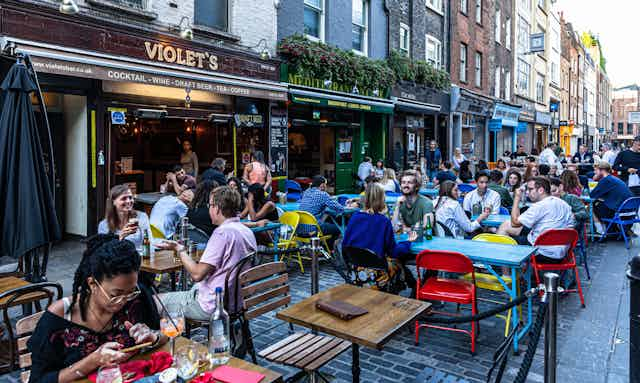May 17 is probably circled and underlined in many British people’s diaries. It marks a key point in the UK’s exit from lockdown: from this date, six people or two households can mix indoors, indoor drinking and dining can resume, and people can stay overnight at other people’s houses.
But there’s a problem. B16172, a subtype of the coronavirus variant currently sweeping through India, is taking hold in some parts of the UK. The government has labelled it a “variant of concern”, as it appears to be spreading quickly. There are worries it could gain a much stronger foothold as Britain reopens.
For now, the government is sticking to its lockdown roadmap, meaning restrictions will still ease on May 17. However, the prime minister hasn’t ruled out using local lockdowns or locally targeted vaccination surges to keep the variant under control.
In the meantime, we need to be careful, says Deborah Dunn-Walters, professor of immunology at the University of Surrey. Early indications are that B16172 is more transmissible than B117, the so-called Kent variant that plagued the UK over winter, and we don’t yet know if it causes more severe disease or exactly how effective it is at evading vaccine-induced immunity. Certainly, anyone waiting for their second vaccine dose should make sure they take it, to ensure they have the greatest possible protection.

This is our weekly round-up of expert information about the COVID-19 vaccines.
The Conversation, a not-for-profit group, works with a wide range of academics across its global network to produce evidence-based analysis and insights. Get more regular updates from trusted experts by subscribing to our free newsletter .
Meanwhile, India’s attempts to get on top of this new variant by increasing vaccination are faltering. In the latest episode of The Conversation Weekly podcast, a panel of experts looks at why rollout there remains sluggish, despite the pressing need to speed things up.
By early May, just over 2% of India’s population had been fully vaccinated against COVID-19. Largely this has been down to a shortage of supply, with a major cause being India’s decision to approve only two Indian-made vaccines for use, meaning leading products such as the Pfizer vaccine are unavailable. Among those who don’t get the vaccine for free – which is everyone under 45 who isn’t a health worker – affordability is now a major issue for many.

In the coming weeks, vaccine passports (certificates that confirm someone has been vaccinated for COVID-19) are likely to be introduced in the UK. It’s not clear how they’ll be used – whether solely for international travel or more broadly to grant people access to restaurants, pubs, bars and other public venues inside the UK – but it’s fair to say they aren’t popular.
But that doesn’t mean they aren’t good for society. These passports are a minimal cost for returning to normal daily life and for reducing anxiety for those you come into contact with, argue Barbara Jacquelyn Sahakian, Christelle Langley and Julian Savulescu. This makes them just a small sacrifice for the greater good.
Finally, while the UK’s vaccine rollout has been a marked success, it isn’t the only European country to have moved quickly. Serbia has managed to fully vaccinate a quarter of its population, despite not having the same vaccine-purchasing power as bigger, richer countries. It’s capitalised on its good relations with both the east and west to secure a diverse portfolio of doses from the UK, US Russia and China, says Jovana Stanisljevic of the Grenoble École de Management.
Get the latest news and advice on COVID-19, direct from the experts in your inbox. Join hundreds of thousands who trust experts by subscribing to our newsletter.

